“The great Aleph occurs when two or more people with a very strong affinity happen to find themselves in the small Aleph. Their two different energies complete each other and provoke a chain reaction. Their two energies…”
I don’t know if I should go on, but I have no choice. Hilal completes the sentence for me.
“… are the positive and negative poles you get in any battery; the power makes the bulb light up. They’re transformed into the same light. Planets that attract each other and end up colliding. Lovers who meet after a long, long time. The second Aleph also happens by chance when two people whom Destiny has chosen for a specific mission meet in the right place.”
Exactly, but I want to be sure she really has understood.
“What do you mean by ‘the right place’?” I ask.
“I mean that either two people can spend their whole life living and working together or they can meet only once and say good-bye forever simply because they did not pass through the physical point that triggers an outpouring of the thing that brought them together in this world. So they part without ever quite understanding why it was they met. However, if God so wishes, those who once knew love will find each other again.”
“Not necessarily, but people like my master and myself, who had shared affinities—”
“Before, in past lives,” she says, interrupting me again. “Or people who meet, like at the party you used as an example, in the small Aleph and immediately fall in love. The famous ‘love at first sight.’ ”
I decide to continue the example she has used.
“Although, of course, it isn’t ‘at first sight’ but linked to a whole series of things that occurred in the past. That doesn’t mean that every such encounter is related to romantic love. Most of them occur because of things that have remained unresolved, and we need a new incarnation in order to finish something that was left incomplete. You’re reading things into the situation that aren’t there.”
“I love you.”
“No, that isn’t what I’m saying,” I exclaim in exasperation. “I’ve already met the woman I needed to meet in this incarnation. It took me three marriages before I found her, and I certainly don’t intend to leave her for someone else. We met many centuries ago and will remain together for the centuries to come.”
But she doesn’t want to hear what I have to say. Just as she did in Moscow, she plants a brief kiss on my lips and sets off into the icy Ekaterinburg night.
Dreamers Can Never Be Tamed
LIFE IS THE TRAIN, not the station. And after almost two days of traveling, it’s also weariness, disorientation, nostalgia for the days spent in Ekaterinburg, and the growing tensions in a group of people confined together in one place.
Before we set off again, I found a message from Yao at reception asking if I fancied doing a bit of aikido training, but I didn’t reply. I needed to be alone for a few hours.
I spent the whole morning getting as much exercise as possible, which for me meant running and walking. That way, when I went back to the train, I would surely be tired enough to sleep. I managed to phone my wife—my cell phone didn’t work on the train—and confide to her that I had my doubts about the usefulness of this Trans-Siberian trip, adding that, although the journey so far had been a valuable experience, I might not carry it through to the end.
She said that whatever I decided was fine with her and not to worry. She was very busy with her paintings. Meanwhile, she’d had a dream that she couldn’t understand. She had dreamed that I was on a beach and someone walked up from the sea to tell me that I was finally fulfilling my mission. Then the person vanished.
I asked if that person was male or female. She didn’t know, she said, the face was covered by a hood. Then she blessed me and again reassured me, telling me not to worry. Even though it was still only autumn, she said, Rio was like an oven already. She advised me to follow my intuition and take no notice of what other people were saying.
“In that same dream, a woman or a girl, I can’t be sure, was on the beach with you.”
“There’s a young woman with me here on the train. I don’t know how old she is, but she’s definitely under thirty.”
“Trust her.”
IN THE AFTERNOON, I met up with my publishers and gave a few interviews, then we had supper at an excellent restaurant and at about eleven o’clock at night headed for the station. Back on the train, we crossed the Ural Mountains—the chain of mountains that separates Europe from Asia—in the pitch dark. No one saw a thing.
From then on, it was back to the old routine. When day broke, we all appeared at the breakfast table as if summoned by some inaudible bell. Again, no one had managed to get a wink of sleep, not even Yao, who seemed accustomed to this type of journey. He was beginning to look ever wearier and sadder.
As usual, Hilal was there waiting, and, as usual, she had slept better than anyone else. Over breakfast, we began our conversation with complaints about the constant rocking of the carriage, then I went back to my room to try to sleep, got up again a few hours later, and returned to the lounge, where I encountered the same people. Together we bemoaned the thousands of kilometers that still lay ahead. Then we sat gazing out the window, smoking and listening to the irritating piped music issuing from the train’s loudspeakers.
Hilal now barely spoke. She always sat down in the same corner, opened her book and began to read, removing herself from the group. No one else, apart from me, seemed bothered by this, but I found her behavior very rude indeed. However, when I considered the alternative—her penchant for making inappropriate remarks—I decided to say nothing.
I would finish breakfast, go back to my compartment to sleep or doze or write. As everyone agreed, we were rapidly losing all sense of time. We no longer cared if it was day or night; our days were measured out in mealtimes, as I imagine the days of all prisoners are.
We would turn up in the lounge to find supper was served. More vodka than mineral water was drunk, and there was more silence than conversation. My publisher told me that when I wasn’t there, Hilal played an imaginary violin, as if she were practicing. I know that chess players do the same, playing entire games in their head, without the need of a board.
“Yes, she’s playing silent music for invisible beings. Perhaps they need it.”
…
ANOTHER BREAKFAST. Today, though, things are different. Inevitably, we are starting to get used to our new way of life. My publisher complains that his cell phone isn’t working properly (mine doesn’t work at all). His wife is dressed like an odalisque, which strikes me as both amusing and absurd. She doesn’t speak English, but we somehow manage to understand each other very well through looks and gestures. Hilal decides to take part in this morning’s conversation and describes some of the difficulties faced by musicians struggling to make a living. It might be a prestigious profession, but many musicians earn less than taxi drivers.
“How old are you?” asks my editor.
“Twenty-one.”
“You don’t look it.”
She says this in a way that implies she looks much older. And she really does. It had never occurred to me that she was so young.
“The director of the music conservatory came to see me at the hotel in Ekaterinburg,” says the editor. “She said you were one of the most talented violinists she’s ever known but that you had suddenly lost all interest in music.”
“It was the Aleph,” Hilal replies, avoiding my eyes.
“The Aleph?”
Everyone looks at her in surprise. I pretend not to have heard.
Читать дальше






